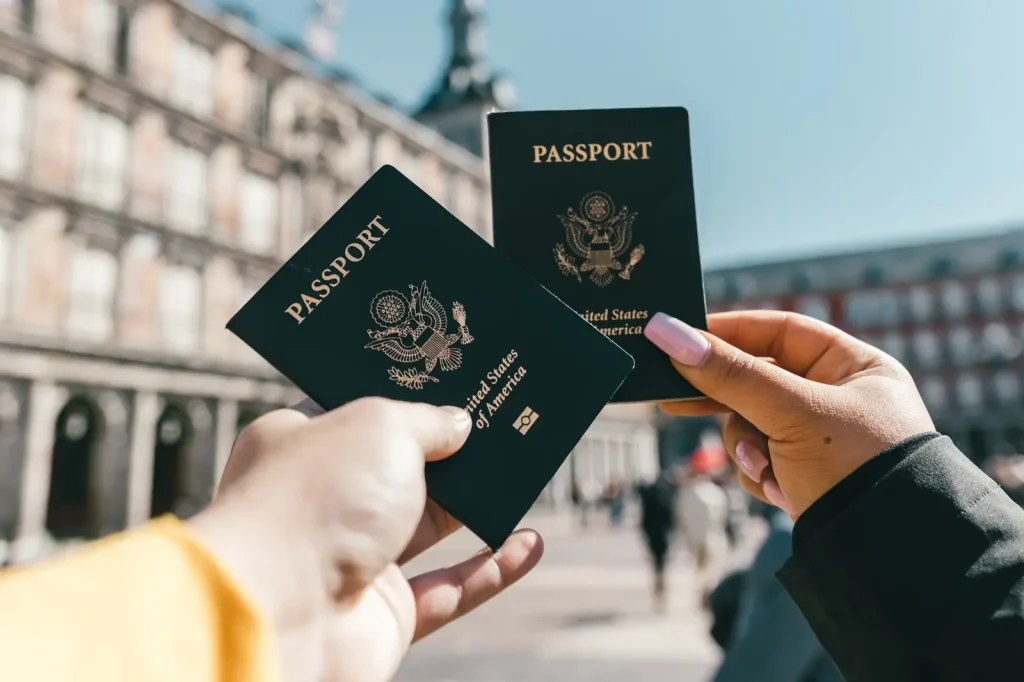
How to Get a Marriage Green Card in the U.S.: A Step-By-Step Guide
June 10, 2025
The K-1 Fiancé Visa in the US: What It Is and How to Apply
July 22, 2025
How to Get a Marriage Green Card in the U.S.: A Step-By-Step Guide
June 10, 2025
The K-1 Fiancé Visa in the US: What It Is and How to Apply
July 22, 2025
How to Petition for a Family-Based Immigration Visa to the U.S.
Maybe it’s been years since you’ve seen your parents. Or maybe your younger brother is still overseas, waiting for his chance at the life you’ve started building here. For so many families, family-based immigration isn’t about a new start—it’s about reconnecting.
Whatever your story, if you’re a U.S. citizen or green card holder, you may be eligible to petition for certain relatives to join you via a family-based immigrant visa. But who qualifies—and how long it takes—depends on details that aren’t always easy to untangle.
This guide breaks down what you need to know about family-based immigration: which relatives can be sponsored, what’s realistic to expect, and how to avoid common roadblocks.
At Strang Immigration, we know how overwhelming the U.S. immigration law can feel—and how important it is to get it right. We’re here to guide you every step of the way.
Contact us to learn how we can support your unique situation.
Family-Based Immigration 101: Who You Can Sponsor Depends on Your Status
U.S. immigration law makes a sharp distinction between citizens and lawful permanent residents (green card holders). That distinction shapes which family relationships you can petition for—and how long they might have to wait. Here's a breakdown of how to submit a petition:
If you’re a U.S. citizen, you can petition an immigrant visa for:
- Your spouse
- Unmarried children under 21
- Unmarried children 21 or older
- Married children of any age
- Your parents (if you’re 21+)
- Your siblings (if you’re 21+)
If you’re a green card holder, you can petition for:
- Your spouse
- Your unmarried children (any age)
You won’t be able to sponsor married children, siblings, or parents until you become a U.S. citizen.
Not All Family Petitions Move at the Same Pace

Some relatives qualify as immediate relatives, while others fall into the family preference system. These two categories affect whether your loved one has to wait for a visa—or can move forward as soon as your petition is approved.
The Process for Immediate Relatives vs Everyone Else
Immediate relatives (spouses, parents, and unmarried children under 21 of U.S. citizens) don’t have to wait for a visa to become available. They’re not subject to annual caps.
Family preference categories include everyone else. These visas are limited each year, which can lead to years—or even decades—of waiting, especially for siblings and adult children.
The date you file your petition becomes the priority date. For preference categories, this is what determines your place in line. That’s why timing matters, and you always want to use a US immigration lawyer you can trust.
Understanding the Family-Based Immigration Process
To petition for a relative, you’ll first file Form I-130 with U.S. Citizenship and Immigration Services (USCIS). This form confirms your relationship and starts the process.
You’ll need to include:
- Proof of your status (citizenship or green card)
- Documents proving your relationship (such as birth or marriage certificates)
- Filing evidence that matches the type of relative you're petitioning for
Once USCIS receives your form, they’ll send you a receipt notice. From there, the process splits depending on who you're sponsoring, the relationship to the family member, and where they are.

How to get a green card if your relative is outside of the United States
Once the petition is approved and a visa is available, your relative will apply for an immigrant visa through a U.S. consulate. This part is called consular processing, and includes submitting forms, paying fees, attending a medical exam, and going to an interview.
How to get a green card if your relative is in the U.S.
If they’re eligible to adjust status, they may be able to stay in the U.S. and apply for their green card through Form I-485. That application includes biometrics, a possible interview, and a medical exam. Some may also qualify to apply for a work permit while the case is pending.
Adjustment of Status vs. Consular Processing in Family Petitions
Once you've filed a family-based petition and it's approved, your relative will either go through consular processing or adjustment of status—depending on where they are and whether they're eligible for a green card inside the U.S.
If your relative is living abroad, they’ll complete the next steps at a U.S. consulate. This is known as consular processing.
If they’re already in the U.S. and meet the requirements, they may apply for adjustment of status by filing the Application to Register Permanent Residence (Form I-485). This option allows them to apply for a green card and become a permanent resident without leaving the country.
Which path applies depends on your relative’s immigration history, visa availability, and whether the person petitioning is a citizen or lawful permanent resident. Even after an approved petition for adjustment, eligibility to move forward isn’t automatic—an immigration officer will still review the case closely before making a final decision.
What Can Delay a Family Petition?

- Missing or incomplete documentation
- Prior immigration violations
- Ineligibility based on status or relationship
- Filing for someone in a preference category without understanding the backlog
These mistakes can cost families time—and in some cases, the chance to proceed at all. That’s why it’s important to get legal guidance for U.S. immigration applications early, especially when dealing with long waits or complicated histories.
Common Questions About Family-Based Immigration
Can I bring my parents to the U.S.?
Only if you’re a U.S. citizen and over 21. Green card holders can’t sponsor parents.
What about siblings?
You must be a U.S. citizen and 21 or older. The wait time for siblings is often the longest of all family categories.
Can a green card holder sponsor a spouse?
Yes. But unlike U.S. citizens, green card holders may face longer wait times—even for spouses—because they’re in a capped visa category. If you're not yet married but planning to be, the K-1 fiancé visa allows your partner to enter the U.S. with the intent to marry and later apply for a green card.
What happens if my relative overstayed a visa?
This can complicate things. In some cases, they may still be eligible to adjust status, but in others, leaving the country to finish the process could trigger bars to reentry. It depends on the full immigration history. Always get U.S. immigration legal advice unique to your situation.
What is consular processing?
It’s the process used when your relative is outside the U.S. and applies for their immigrant visa through a U.S. embassy or consulate. It’s common in most family petitions unless the person is already lawfully in the U.S.
Can my relative live in the U.S. while they wait?
Only if they already have legal status here and are eligible to adjust status. Otherwise, they must remain abroad during the process.
What should I know about green cards for family preference immigrants?
Unlike immediate relatives of U.S. citizens, relatives in the family preference system face visa limits each year. A green card for family preference applicants typically involves a longer wait and stricter prioritization. These categories include adult children, married children, and siblings of U.S. citizens, as well as spouses and unmarried children of green card holders.
Once the immigrant visa petition (Form I-130) is approved, applicants in these categories must wait for their priority date to become current. This is based on rules outlined in the Immigration and Nationality Act and tracked through the Department of State’s Visa Bulletin.
When the date becomes current, the applicant may become eligible to apply for the next step—either consular processing abroad or the adjustment of status process inside the U.S. This leads to lawful permanent resident status, also known as a green card.
All petitions are processed through United States Citizenship and Immigration Services (USCIS), the federal agency responsible for handling family-based applications. Once approved, your relative receives permanent resident status and may later qualify for citizenship, depending on the timeline and relationship.

What if there’s an issue during the green card process?
Whether your relative is applying through adjustment of status and consular processing or just beginning the application, there are times when United States Citizenship and Immigration Services (USCIS) or a U.S. consulate may issue a request for more information.
This could happen if the agency needs additional documentation, clarification about status in the United States, or more proof related to the specific family relationship. In these cases, USCIS may issue an Application for Action on an Approved Petition (Form I-824) or send a formal request that you’ll need to respond to quickly and carefully.
How you respond to immigration matters. Delays, missing evidence, or inconsistencies can slow your case—or even result in denial. Officers make decisions based on evidence, so it's critical that every part of your filing is accurate, complete, and well-supported from the start.
If your relative is applying from abroad, they’ll need to follow the instructions provided by the consulate. If they’re applying from inside the U.S., they’ll need to maintain lawful status in the United States throughout the process.
How To Find an Immigration Lawyer You Can Trust
There’s no shortcut when it comes to family-based immigration—but there is a right way to move forward. That means knowing whether your relative qualifies, understanding how long the process might take, and preparing the strongest possible petition from the start.
If you’re planning to sponsor a family member, Strang Immigration is here to guide you through it. Whether it’s your child, parent, or sibling, we’ll help you build a clear, customized strategy—so you know exactly what to expect and how to prepare.
Get in touch today to learn how we can support your family’s next step.
ABOUT US

We are dedicated to protecting your legal rights at every stage of the process. Discover for yourself how our immigration attorneys can help you obtain a successful outcome



